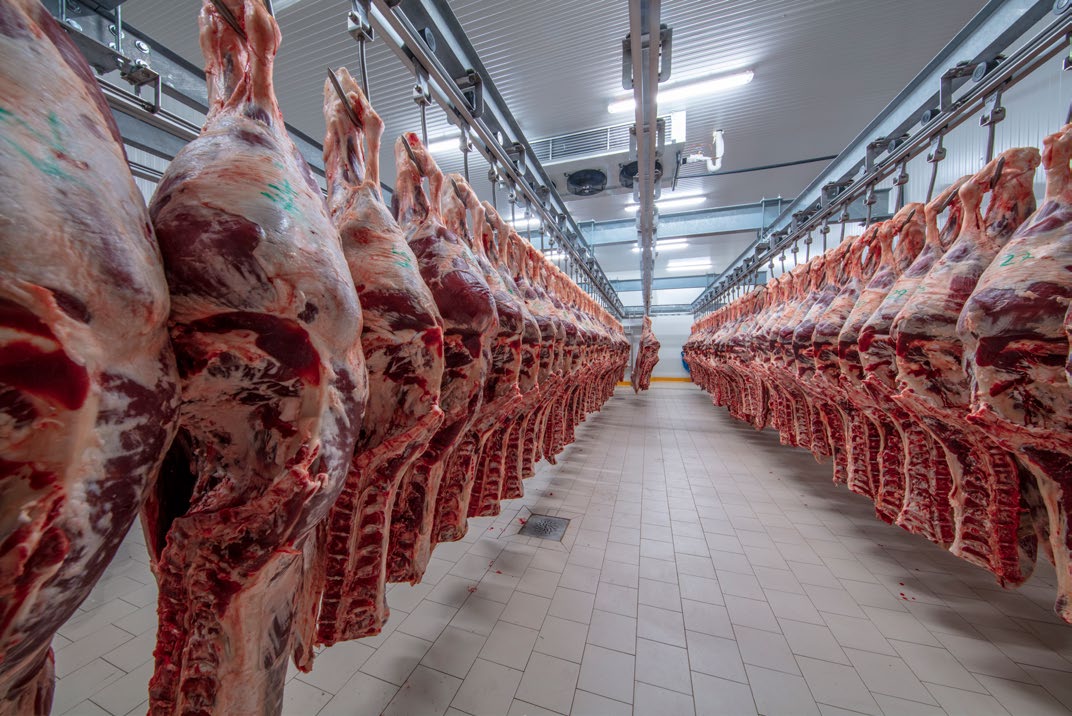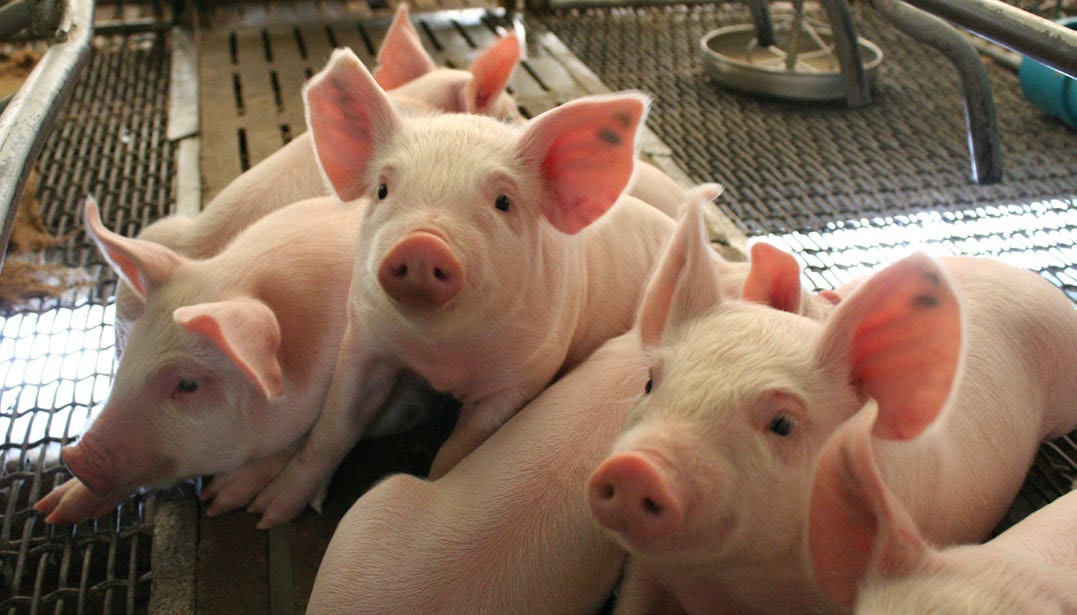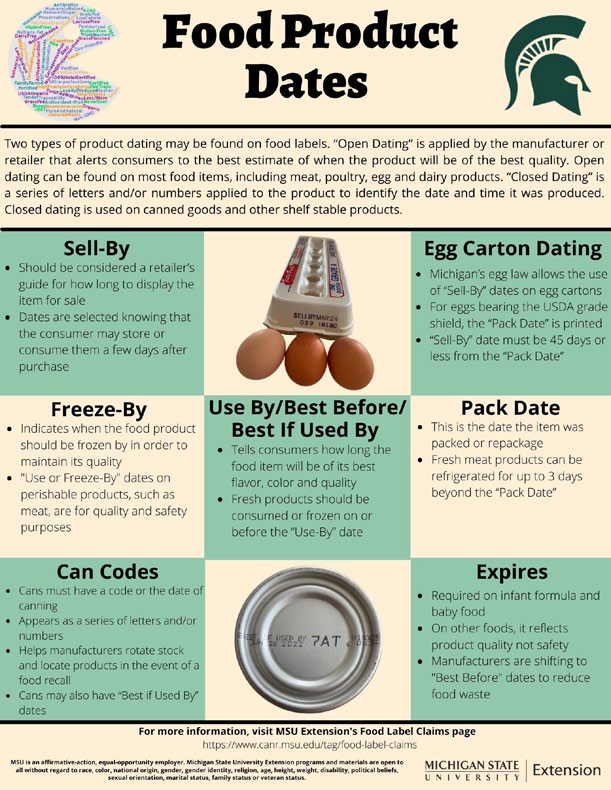
MSU Extension Supports Food Processing in Michigan
DOWNLOADMay 11, 2022 - MSU Extension
IMPACTS
The ability to combine scientific expertise, research capabilities and practical experience allows Michigan State University Extension educators and scientists to work together and generate advancements in food, health and the environment, creating impactful data for Michigan communities. Our partnership between research and outreach allows MSU Extension to do what it does best: meet people where they are to share easy-to-access resources across the state. Whether it is at an outreach event, in their workplace or at home, MSU Extension puts resources in the hands of the people who need them.
- $104.7 Billion dollars on an annual basis is the contribution from Michigan's food and agriculture industry¹
- 5.13 Billion is the economic impact of the animal agriculture industry in Michigan¹
- MSU Extension works to increase farmer success while protecting the environment, ensuring food safety, reaching new markets and advancing agriculture through applied research. Agriculture is now one of the fastest growing sectors of the Michigan economy.
- MSU Extension serves the animal agriculture industry by engaging in research, education and outreach that enhances the quality of life for residents throughout the state.
- MSU Extension's agriculture literacy efforts strive to improve consumer knowledge and trust in animal care, food safety and food production methods.
FOR MORE INFORMATION:
Beth Ferry, MSU Extension pork educator,
269-876-2745, franzeli@msu.edu
Sarah Fronczak, MSU Extension
environmental management educator,
517-439-9301, froncza3@msu.edu
Charles Gould, MSU Extension bioenergy educator,
616-834-2812, gouldm@msu.edu
Water Quality Impacts of Mortality Disposal on Soil
Implications from the COVID-19 pandemic were widespread, and many of these impacts were felt in the food processing industry. Staffing shortages slowed processing capabilities, creating substantial supply chain disruptions and challenges for farmers as they managed the growth of their animals alongside limits to marketing opportunities. In some states, to avoid animal welfare issues, the only option for farmers was mass depopulation of entire barns of marketable swine. With the guidance of MSU Extension, Michigan farmers were able to implement mitigation strategies to avoid this tragic situation. Unprepared for this type of depopulation event, state departments, farmers and industry groups learned how to manage large quantities of animal mortalities by learning from experience.

No data existed that showed what potential impacts composting ground animal carcasses could have on groundwater when placed on bare soil. MSU Extension’s environmental management team quickly worked to address this issue. They understood that if pollutants from these organic materials leach through the soil, there could be movement of soil metals. This is of particular concern in Michigan due to the shallow groundwater table as well as the prevalence of sandy soils. To establish the safety of this practice and generate best management practices for farmers faced with this situation, MSU Extension created research opportunities to address this issue.
Extension experts conducted a laboratory experiment to simulate a “worst-case scenario” of mortality composting on both sandy loam and loamy sand, types of Michigan soil. Immature mortality compost was produced and applied to the soil columns. Synthetic rainwater was applied in a schedule following a Michigan wet spring, a 25-year storm and two sequential 10-year storms. Data were collected from this project including collecting groundwater quality information and moisture content. Additionally, metal concentrations were reviewed and found variable, thus spearheading further research on the natural variability of metal mobilization while using composting practices to manage mortality. Scientists and MSU Extension educators are still reviewing the findings of this project, and suggestions for best management practices are being compiled.
The efforts of the MSU Extension environmental management team will directly affect the ability of farmers and the state to manage large scale depollution events with a sharp focus on environmental protection. The results of this project will allow us to introduce new mortality disposal methods that could be allowed in Michigan. By creating options for more types of mortality disposal in the right conditions, environmental harm will decrease because people have the information they need to choose a solution that meets conditions surrounding the event. Furthermore, this project may provide the needed information for the Natural Resources Conservation Service to expand their funding opportunities for mass mortality disposal method.
Characterizing Wastewater from Meat Processing Facilities

Michigan is home to many natural resources including lakes, ponds, streams and canals. The health of these different aquatic systems is dependent on many things including the state’s ability to manage nutrient runoff and pollution from roads, lawns, homes, businesses and farming operations.
One of these concerns, specifically with environmental regulators, is the amount of biochemical oxygen demand (BOD) and other constituents within the wastewater that are generated by food processing businesses. Making sure these operations are using the appropriate method(s) of treatment and disposition of the wastewater is critical in mitigating situations that could cause fish to die in surface water. As a result, soon all meat processors will need to obtain a groundwater discharge permit from the Michigan Department of Environment, Great Lakes and Energy and have an approved method of disposal. The permit application must include a basis of design for the wastewater treatment system, including wastewater characterization, effluent volumes and a sampling plan as well as proposed storage, a treatment system or both.
To develop systems and processes that allow for food processing businesses to manage their wastewater using environmentally sustainable methods, more information and data were needed. MSU Extension worked to fill the void created by the significant lack of data and understanding of the actual amount of wastewater created and the constituent content of it. Researchers and Extension educators worked together to design a project that will fill in the gaps of the data and give a better understanding of processing wastewater with the goal of characterizing the wastewater constituents and developing pretreatment options. This project will survey existing meat processing plants that are sending wastewater to municipalities across the state as well as those using on-site treatment. Researchers will compare project results with existing industry data for those industries and design preliminary treatment solutions that can be field demonstrated while protecting groundwater and are reasonable to achieve.
This project will lead to a better understanding of current wastewater constituents from meat processing facilities and ultimately refine future research projects for alternative treatment systems. The project is moving forward with sampling and seeking additional funding to develop affordable BOD testing procedures for facilities. Focusing on the issues that directly affect agriculture and agriculture businesses, MSU Extension continues to meet the needs of people across Michigan by identifying areas of concern and limited information, creating opportunities to address these needs and working to get solid, creditable information into the hands of the people who need it.
175 |
USDA- inspected meat and poultry establishments in Michigan.² |
239-plus |
additional retail or custom exempt facilities in Michigan |
46,136 (directly)156,370 (indirectly) |
people employed by the meat packing industry in Michigan |
MSU Extension Supports Animal Care & Food Safety Through Quality Assurance Programming

Quality assurance programs are a staple for the beef and pork sectors of the animal agriculture industry. The Pork Quality Assurance (PQA) Plus program is the flagship program of the pork industry. Similarly, Beef Quality Assurance (BQA) is a program supported by the cattle industry. Both programs use good production practices that ensure the safety and quality of products grown and raised for consumption. Additionally, implementing the good production practices highlighted by these programs can help producers avoid costly production mistakes and unacceptable production defects. Commercial processing plants can require certification and on-farm assessment of animal care and food safety. By providing the opportunity to receive this certification, MSU Extension helps to provide market availability for the farmers involved in these industries.
MSU Extension educators and specialists provide the statewide management of these programs, which includes comprehensive training of the advisors who implement them on farms. They also directly provide education for livestock farmers and their employees on animal care practices and on-farm food safety. On-farm assessments that accompany these certification programs allow MSU Extension educators to review production practices and assist the farmers with enhancing their practices to continuously meet food safety standards.
By offering access to these important quality assurance programs, MSU Extension provides livestock farmers with a method to maintain customer confidence in the products they raise. Producers gain knowledge in proper animal care and learn more about production practices that improve the productivity of their farms while providing economically logical management options. As a result of farm certification in the BQA program, each animal sold generates approximately $16.80 per head sold in added value compared to selling the same animal from a noncertified farm.4 This creates significantly more farm income for BQA–certified farms and continues to connect producers to the MSU beef team and current educational opportunities.
$16.80Per Head |
sold of added value is generated when a farm sells animals certified through the Beef Quality Assurance (BQA) program.4 |
1.18Million |
More than 1.18 million hogs a year are raised by Michigan pig farmers. The Pork Quality Assurance (PQA) Plus program provides an opportunity for market access for these animals certified through this program.5 |
Supporting Michigan's Diverse Population When Making Food Choices
Consumers have difficulty making informed choices when making food purchasing decisions because food label claims are confusing. In response, MSU Extension staff worked to develop food label claim infographics to help consumers better understand what they are buying. The infographics address topics such as food product dates, introduction to food label claims, dairy and alternative beverages. Others still in the process of being developed include animal diets, grains and sweeteners.
To expand the reach of the infographics and meet the needs of Spanish-speaking Michiganders, all seven of the food label claim infographics have been translated to Spanish.
MSU Extension created the infographics with community nutrition instructors in mind as they regularly receive questions from their program participants around many of these food label claims. However, the food label infographics have multiple uses. When part of the team was approached to create a display at the Michigan State Fair, the existing seven food label claim infographics were printed as posters and used in this display. A QR code was also created and made available for those that viewed the display and wanted to refer to the information after their visit to the fair.
This information is readily available for health and nutrition professionals to share and accessible for consumers looking to make informed decisions about their food purchases. With food purchases continuously making up a growing portion of household budgets, people need access to current, relevant, evidence-based information to help them make choices for their families. MSU Extension’s vast network of educators, with in-depth understanding of food labels, agricultural practices and nutritional value, make them the perfect source to generate this information so consumers can make informed choices.

Resources
1 Michigan. gov. (n.d.). Facts about Michigan agriculture. https://www.michigan.gov/mdard/ about/mi-agriculture/michigan-agriculture-resources#:~:text=Economy,economic%20impact%20of%20 %245.12%20billion
2 U.S. Department of Agriculture Food Safety and Inspection Service. (2022, March 29). Meat, poultry and egg product inspection directory. https://www.fsis.usda. gov/inspection/establishments/meat-poultry-and-egg-product-inspection-directory
3 North American Meat Institute. (2020). The meat and poultry institute creates jobs in Michigan. John Dunham & Associates. https://nami.guerrillaeconomics.net/ reports/382b7bd4-ed81-4d34-a4c6-7684d91f3d2a?
4 Beef Quality Assurance. (n.d.). BQA-certified producers earn more per head sold. https://www.bqa.org/Media/ BQA/Docs/bqa-value-study-digital.pdf
5 Michigan Ag Council. (n.d.). Pork: Michigan pork facts. https://michigangrown.org/pork/



 Print
Print Email
Email